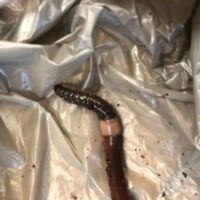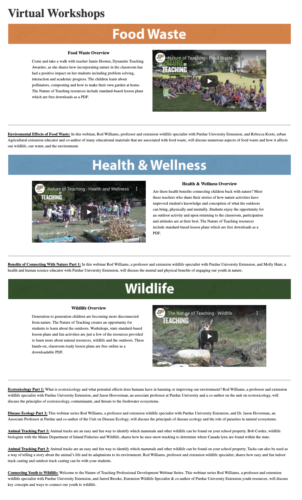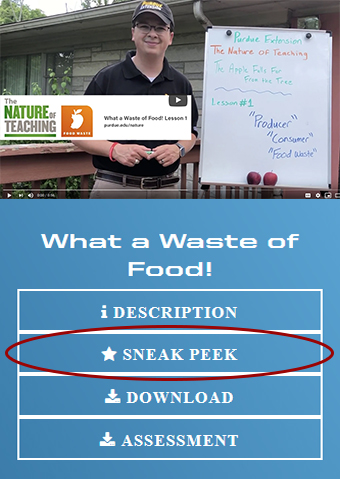 Purdue University - Extension - Forestry and Natural Resources
Purdue University - Extension - Forestry and Natural Resources
Got Nature? Blog
Are you an Indiana teacher who is looking to incorporate natural resources, forest ecology and forest management into your curriculum?
Apply now for the Indiana Natural Resources Teacher Institute, an immersive multi-day professional development workshop that will bring 18 teachers from across the state to Morgan-Monroe State Forest to see firsthand how forestry works in Indiana. Sessions from June 24 to 28 will include tours of public and private forest lands, forest industry facilities, and information about forestry research in Indiana.
The goal of the institute, which is co-hosted by the Indiana Department of Natural Resources and Purdue Forestry and Natural Resources Extension, is to provide Indiana teachers with knowledge, skills and tools to effectively teach their students about forest ecology and forest management practices. The forest environment becomes the basis for integrating the learning of many subject areas, including environmental science, biology, natural resources, and social science. The NRTI incorporates STEM concepts and principles throughout the sessions and empowers educators to foster conceptual learning, critical thinking and decision-making skills in their classrooms.
The Natural Resources Teacher Institute emphasizes the importance of conservation of natural resources with special attention given to Indiana’s forests and forest products. The project-based approach integrates hands-on study of the natural and cultural resources of the local community, addresses concepts in ecology, sense of place, civics, economics and forest land management and stewardship.
Participants will develop a curriculum project about forests or forestry for their classrooms. Participants will earn 30+ Professional Growth Points and receive a stipend upon documentation of implementing curriculum project. Concepts are linked to the Indiana Learning Standards and participants are provided resources and training from Project Learning Tree as well as forestry equipment kits.
The 2024 edition of the NRTI will begin on Monday, June 24 at 1:00 pm and conclude on Friday, June 28 at noon. The base of operations will be the Forestry Training Center at Morgan-Monroe State Forest near Martinsville. Teachers will stay in the Training Center, sharing one of the 10 sleeping rooms. Meals will be provided.
Interested educators must complete an application and submit it by the deadline of March 22, 2024. Successful applicants will be notified by April 1, 2022. The institute is limited to 18 participants per session. There is no cost for participants. Those accepted will be required to pay a $50 deposit, which will be refunded at the end of the program. Participants will receive a stipend when documentation is provided that they have implemented their curriculum project with their students.
- Attendees must be available to participate in all days of the institute. (Individual participation only – spouses and/or children, etc., are not permitted.)
- Participants must be able to actively participate in all activities, which will include walking, hiking, summer temperatures, insects, etc. Reasonable accommodations will be made for individuals with disabilities who may need assistance.
- Participants must have the ability to implement a curriculum project in their educational setting.
For more information and to request an application for the NRTI, contact Project Learning Tree Coordinator Lexi Eiler via email at leiler@dnr.in.gov or via phone at 463-253-8835.
To get a glimpse at the curriculum and also feedback from past participants, read NRTI Takes Forestry to the Classroom.
To register, please fill out the NRTI Application.
Resources:
Purdue Forestry and Natural Resources Facebook Page
Project Learning Tree
Indiana Department of Natural Resources Division of Forestry
The Nature of Teaching, Purdue Department of Forestry and Natural Resources
The Nature of Teaching: Trees of the Midwest, The Education Store
The Nature of Teaching: Adaptations for Aquatic Amphibians, The Education Store
Trees of the Midwest Webinar, Nature of Teaching YouTube channel
Indiana Forestry Educational Foundation, Indiana Forestry & Woodland Owners Association
Forest/Timber, Playlist, Purdue Extension – Forestry and Natural Resources YouTube Channel
Natural Resources Teacher Institute Takes Forestry to the Classroom, Purdue FNR News
Purdue Extension
Lexi Eiler, Coordinator
Indiana Project Learning Tree
Lenny Farlee, Sustaining Hardwood Extension Specialist
Purdue University Department of Forestry and Natural Resources
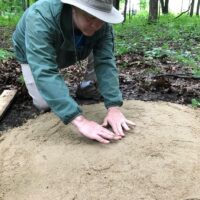
During K-12 Educator workshops, participants learn how to implement TNT curriculum such as building scent stations (pictured above). Photo by Jarred Brooke.
Agricultural & Natural Resources: Richard Louv’s words, “Time in nature is not leisure time, it’s an essential investment in our children’s health (and also, by the way, in our own),” underscores the critical role of nature in children’s well-being. Inspired by Louv’s concept of “nature deficit disorder,” The Nature of Teaching (TNT) was established in 2009 to connect youth to nature. The Nature of Teaching became an ANR signature program in 2019.
The primary focus of TNT is to engage K-12 youth with nature to foster environmental awareness and reap the positive health benefits of outdoor experiences. The program achieves this by integrating nature-based education into the school environment through standards-based curriculum. Through this, TNT not only connects students with nature but also provides lessons that align with Common Core and Next Generation Science standards.
The curriculum of The Nature of Teaching is divided into three key areas: Wildlife, Health and Wellness, and Food Waste. The Wildlife curriculum enhances students’ understanding of the natural world, while the Health and Wellness curriculum emphasizes the health benefits of connecting with nature. The Food Waste curriculum explores the environmental impact of food waste. Educators have access to more than 60 free standards-based lesson plans suitable for K-12 classrooms. In addition, TNT includes five informal curriculum units that are not standards-based and are more activity-focused. These informal lessons are great for field days and after-school type programs.

Veronica Bullock teaching a TNT lesson, Adaptations for Aquatic Amphibians, in a Union County classroom. Photo by Jennifer Logue.
Extension educators around the state have delivered TNT lessons to K-12 students since TNT became a signature program in 2019. In 2022 alone, 2,424 K-12 students benefited from TNT instruction, highlighting an impressive average knowledge increase of 16-31% in natural resources topics. The Nature of Teaching further supports K-12 educators through teacher workshops, with 17 teachers attending a workshop at Big Oaks National Wildlife Refuge in 2022. Attendees reported a significant boost in knowledge and confidence in connecting youth with nature.
As part of the signature program, Extension educators deliver three educational sessions using TNT formal curriculum to at least 15 students. Educators are also asked to provide students with pre- and post-tests to better understand student learning outcomes. Most educators deliver TNT in their local school system over several weeks. However, others deliver TNT through school clubs, after-school programs, or other avenues. The signature program requirements for Nature of Teaching are on the ANR Intranet. Educators are encouraged to work across program areas to deliver TNT.
Starting this year, The Nature of Teaching will be co-led by Jarred Brooke, Extension wildlife specialist, and Veronica Bullock, ANR educator, Franklin County. Jarred and Veronica have a long history with the TNT program and are excited to lead TNT into the future.
For educators who are interested in TNT, we will host a webinar on April 2 at 10 a.m. EDT to discuss future changes to the Nature of Teaching Signature program. You can register for the webinar here.
To see this article and others, please visit ANR Newsletter-February 2024.
Visit Nature of Teaching to learn more and explore the different lessons.
Resources:
Virtual Workshops, Nature of Teaching
Nature of Teaching, Website, Purdue College of Agriculture
The Nature of Teaching, YouTube channel
Transporting Food Waste, The Education Store, Purdue Extension resource center
Benefits of Connecting with Nature, The Education Store
Nature of Teaching: Common Mammals of Indiana, The Education Store
The Nature of Teaching: Food Waste Solutions, The Education Store
The Nature of Teaching: Food Waste and the Environment, The Education Store
The Nature of Teaching: Trees of the Midwest, The Education Store
The Nature of Teaching: Adaptations for Aquatic Amphibians, The Education Store
Trees of the Midwest Webinar, Nature of Teaching YouTube channel
Adaptations For Aquatic Amphibians Webinar, Nature of Teaching YouTube channel
Agriculture & Natural Resources (ANR)
Jarred Brooke, Wildlife Extension Specialist
Purdue Department of Forestry and Natural Resources
Veronica Bullock, ANR Extension Educator
Purdue Extension Franklin County
Purdue Landscape Report: Asian jumping worms, a group of invasive earthworms, have gained a significant amount of media attention in the last several weeks, and for good reason. Unlike the nightcrawlers and other earthworms we know, Asian jumping worms do not improve soil health to the benefit of plants. Instead, jumping worms (also called crazy worms, snake worms, or ‘Alabama jumpers’) almost completely strip nutrients out of soil, altering the soil structure and severely impairing the ability to develop many kinds of plants. After they are done with an area, Asian jumping worms leave behind soil that has a texture similar to that of coffee grounds and very low nutritional value. On top of this, Asian jumping worms are capable of reproducing asexually, allowing their population to grow very rapidly and making them an invasive species of some concern.
Identification
The good news is that Asian jumping worms are not well-suited to Indiana’s environment. They aren’t capable of surviving winters in any life stage except as an egg, meaning their activity periods are limited to late June to the first hard frost of the year. If you see worms outside of this period, it’s highly unlikely an Asian jumping worm. There are also a few traits the worms have that you can use to visually confirm their identity. First off, Asian jumping worms are accurately named; when handled, they writhe and thrash similar to snakes, setting them apart from common earthworms and nightcrawlers. Jumping worms also tend to have drier skin that has an almost iridescent appearance, as compared to the slimy, moist texture of the beneficial earthworms we need for good soil health. The most consistent feature is an organ known as the clitellum, or the reproductive organs of worms. On common earthworms, this looks like a saddle-shape that partially covers several segments, is normally reddish-brown, and is raised off the surface of the body. On an Asian jumping worm, however, the clitellum is indistinguishable from other segments, save for their pale, milky color.
To view this article and other Purdue Landscape Report articles, please visit Purdue Landscape Report.
Subscribe and receive the newsletter: Purdue Landscape Report Newsletter.
Resources:
The Purdue Landscape Report
Purdue Landscape Report Facebook Page
Gardeners Asked to be Vigilant This Spring for Invasive Jumping Worm, Purdue Extension – FNR Got Nature? Blog
Fall webworms: Should you manage them?, Purdue Landscape Report
Mimosa Webworm, The Education Store, Purdue Extension resource center
Sod Webworms, Turf Science at Purdue University
Bagworm caterpillars are out feeding, be ready to spray your trees, Purdue Extension Forestry & Natural Resources (FNR) Got Nature? Blog
Purdue Plant Doctor App Suite, Purdue Extension-Entomology
Landscape & Oranmentals-Bagworms, The Education Store
What are invasive species and why should I care? (How to report invasives.), Purdue Extension – FNR Got Nature? Blog
Indiana Invasive Species Council
Ask An Expert, Purdue Extension-Forestry & Natural Resources
Bob Bruner, Exotic Forest Pest Specialist
Purdue Department of Entomology
Among the steel and concrete that make up the urban environment, trees provide welcome relief from heat and potentially unfavorable sights and smells. Trees provide value from ecosystem services, which can refer to any of the benefits humans obtain from nature. Trees in the built environment provide many benefits, such as storing carbon, reducing air temperature and air conditioning costs, filtering air and water pollutants, intercepting rainwater to reduce flooding, and increasing aesthetic value.
The Preparing Indiana’s Urban Forest for Climate Change is an overview of choosing species of trees that will thrive in urban settings has always required careful consideration, but climate change is making that task even more important. In this paper, Purdue and other researchers provide tools to help urban foresters, arborists and planners adapt so that the ecosystem services that trees provide can be maintained.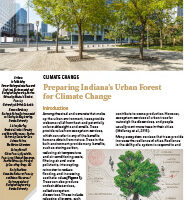
To receive the free download for the Preparing Indiana’s Urban Forest for Climate Change please visit The Education Store.
Resources:
Urban Forestry, Playlist, Purdue Extension – Forestry and Natural Resources (FNR) YouTube Channel
Sustainable Communities, Purdue Extension Program
How to Find an Arborist Near You!, Purdue Extension – FNR Got Nature? Blog
Storms Can Cause Damage and Tree Cleanup, What You Need to Know, Purdue Extension – FNR Got Nature? Blog
Purdue Landscape Report, Purdue Science-Based Midwest Landscaping
Forest Improvement Handbook, The Education Store, Purdue Extension’s resource center
Investing in Indiana Woodlands, The Education Store
Woodland Wildlife Management, The Education Store
ID That Tree, Playlist, Purdue Extension – Forestry & Natural Resources (FNR) YouTube Channel
Julie McAulay, Undergraduate Research Assistant in Environmental and Ecological Engineering
Purdue Department of Forestry and Natural Resources
Lenny Farlee, Sustaining Hardwood Extension Specialist
Purdue University Department of Forestry and Natural Resources
Brady Hardiman, Associate Professor for Environmental and Ecological Engineering
Purdue University Department of Forestry and Natural Resources
Teachers enjoyed gathering creative resources, new student activities and interacting with professionals as they learned how to approach teaching natural resources while using science, technology, engineering and math. Read more to learn how you can apply for a spot for the 2023 NRTI program.
The Indiana Natural Resources Teacher Institute (NRTI) is a multi-day conservation education workshop and tour of forest management, forest industry and forestry research in Indiana. The purpose of the institute is to provide an introduction to the impact sustainable forestry has on our state’s environment, economy, and quality of life, and to equip teachers to apply that knowledge in the classroom.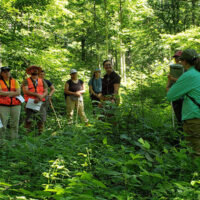
The 5-day workshop advances effective teaching and learning about Indiana’s forest resources and their management. Participants will learn how to approach the teaching of STEM (science, technology, engineering and math) concepts and principles from a natural resource perspective through exposure to professionals, researchers, and industry leaders and hands-on experiences in the field. Participants develop a STEM-based curriculum project to be implemented with their students, bringing natural resource science and management topics and activities into the classroom.
Several partners and many sponsors and supporters facilitate this program. The IN DNR Division of Forestry Project Learning Tree Coordinator, Donna Rogler, is the originator and lead on this project, and the Division provides housing for the participants at the Morgan Monroe State Forest Training Center. Lenny Farlee, Purdue Forestry and Natural Resources Extension Forester, and Mary Cutler, Tippecanoe County Parks and Recreation Naturalist, serve as Instructors/facilitators with Donna for the week of activities and tours. Presenters from several agencies, organizations, and companies assist with field tours and presentations, including a tour and activities on the Hardwood Ecosystem Experiment site at Morgan Monroe State Forest. The connection with this long-term, large-scale research project provides a unique STEM application teachers can take back to their classrooms.
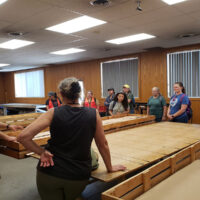 The NRTI program can accommodate up to 18 teachers, with emphasis on primary educators, but welcoming to educators from all ages and backgrounds. Many past participants have called this week the best professional development training they have attended. If you are an educator or know one who would be interested in attending future trainings, contact the Indiana Division of Forestry or keep an eye on the Purdue FNR Extension Calendar to apply for the next session in the summer of 2023.
The NRTI program can accommodate up to 18 teachers, with emphasis on primary educators, but welcoming to educators from all ages and backgrounds. Many past participants have called this week the best professional development training they have attended. If you are an educator or know one who would be interested in attending future trainings, contact the Indiana Division of Forestry or keep an eye on the Purdue FNR Extension Calendar to apply for the next session in the summer of 2023.
Resources:
Project Learning Tree
Indiana Department of Natural Resources Division of Forestry
The Nature of Teaching, Purdue Department of Forestry and Natural Resources
Indiana Forestry Educational Foundation, Indiana Forestry & Woodland Owners Association
Forest/Timber, Playlist, Purdue Extension – Forestry and Natural Resources YouTube Channel
Natural Resources Teacher Institute Takes Forestry to the Classroom, Purdue FNR News
Purdue Extension
Donna Rogler, Coordinator
Indiana Project Learning Tree
Lenny Farlee, Sustaining Hardwood Extension Specialist
Purdue University Department of Forestry and Natural Resources
This unit, part of the Nature of Teaching series, explores the effects of barriers and human assistance on wildlife gene flow. Students will learn about the effects of human-induced factors on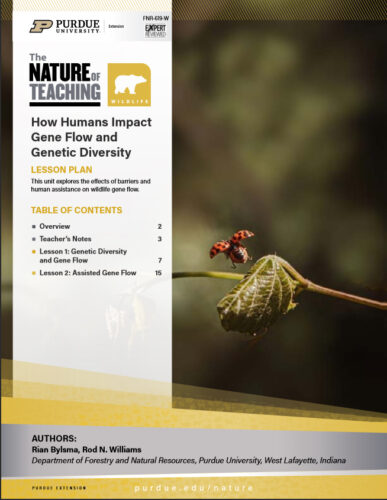 wildlife movement and gene flow, and the effectiveness of human interventions that promote gene flow among wildlife. You will find in the complete curriculum: teachers’ notes, vocabulary words, objectives and required materials for activities including gene flow simulation and estimating genetic variations in lady beetles.
wildlife movement and gene flow, and the effectiveness of human interventions that promote gene flow among wildlife. You will find in the complete curriculum: teachers’ notes, vocabulary words, objectives and required materials for activities including gene flow simulation and estimating genetic variations in lady beetles.
The Nature of Teaching includes formal standards-based curricula and informal activity-based curricula all centered around getting youth outside. The three program areas of the formal curricula include: Wildlife, Health and Wellness, and Food Waste. Each program area provides standards-based lesson plans free as a downloadable PDF. Lesson plans are classroom ready for grades K-12.
Resources:
Nature of Teaching website and Nature of Teaching Youtube Channel
Ask An Expert: Anurans (Frogs and Toads) video, Got Nature?, Purdue Extension-Forestry and Natural Resources
The Nature of Teaching, Unit 3: Reptiles, Amphibians, and the Scientific Method, The Education Store, Purdue Extension resource center
The Nature of Teaching: Ecotoxicology and Environmental Health, The Education Store
Introduction to Nature of Teaching Sneak Peek Videos, Got Nature? Blog, Purdue Extension – Forestry and Natural Resources
Rod Williams, Professor of Wildlife Science
Purdue University Department of Forestry and Natural Resources
Jason Hoverman, Professor of Vertebrate Ecology
Purdue University Department of Forestry and Natural Resources
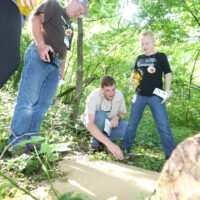 Purdue Extension wildlife specialist Jarred Brooke was honored by the College of Agriculture PK-12 Council on Thursday with the Staff Excellence Award for his work with PK-12 audiences to expand their interest in and preparation for careers in natural resource sciences.
Purdue Extension wildlife specialist Jarred Brooke was honored by the College of Agriculture PK-12 Council on Thursday with the Staff Excellence Award for his work with PK-12 audiences to expand their interest in and preparation for careers in natural resource sciences.The Council’s Outreach and Engagement Awards were established to recognize, reward and celebrate faculty and staff involved in successful outreach and engagement activities and to encourage the improvement and expansion of those activities.
“Winning this award is truly an honor,” Brooke said. “Working with PK-12 youth and youth educators is one of the most rewarding aspects of my job. Each time I see students or teachers have those ‘aha moments’ while connecting with nature it reaffirms that I chose the right career. I would not have been able to win this award if it were not for the help of my many great colleagues at Purdue, other universities, and beyond.
“Connecting youth with nature is so vital because their outdoor experiences now will shape how they view and understand nature as adults, ultimately influencing their willingness to protect and conserve the natural world in the future.”
Brooke, who earned his wildlife degree from Purdue Forestry and Natural Resources in 2012, joined the FNR staff in August 2016. His extension work impacting youth includes conservation field days, writing natural resources-based curricula for The Nature of Teaching signature program, and also planning and overseeing the 4-H and FFA Wildlife Habitat Education Program contest among other things.
Resources:
Nature of Teaching, Purdue Agriculture
Natural of Teaching YouTube Channel
Indiana 4-H Youth Development, Purdue Extension
4-H Academy, Purdue Extension
College of Agriculture PK-12 Council Outreach and Engagement Awards, Purdue Agriculture
National Wildlife Habitat Education Program (WHEP), Teaching Youth Valuable Skills
Jarred Brooke, Wildlife Extension Specialist
Purdue Department of Forestry and Natural Resources
The Nature of Teaching Extension program includes formal standards-based curricula and informal activity-based curricula, all centered around getting youth outside. Topics included are Food Waste, Health & Wellness, and Wildlife. Each program area provides standards-based, classroom-ready, free lesson plans with downloadable PDFs.
The resources keep growing with now opportunities to take the virtual workshops and receive a certificate of completion. The webinars include all the links to the material for K-12 curriculum and activities available. Whether you are a teacher, natural resource leader or a 4-H leader you have the opportunity to use the prepared curriculum with fun activities while teaching K-12 youth about natural resources, conservation, and the environment.
Resources
Virtual Workshops, Nature of Teaching
Nature of Teaching, Website, Purdue College of Agriculture
The Nature of Teaching, YouTube channel
Transporting Food Waste, The Education Store, Purdue Extension resource center
Benefits of Connecting with Nature, The Education Store
Nature of Teaching: Common Mammals of Indiana, The Education Store
Rod Williams, former Professor of Wildlife Science & Wildlife Extension Specialist
Purdue University Department of Forestry and Natural Resources
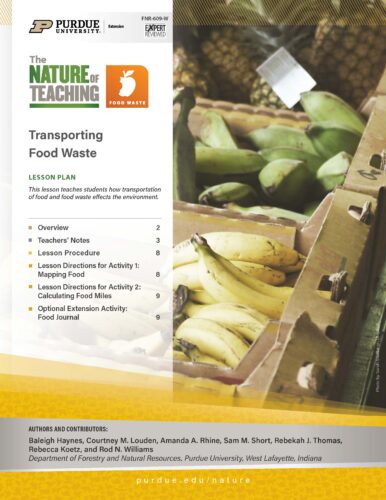 This Nature of Teaching lesson plan teaches students how the transportation of food and food waste affects the environment. Students will expand their vocabulary, broaden their geography, and have fun working on their math skills as they calculate food miles. A list of materials needed and activity instructions for interactive, hands-on activities are included, along with Next Generation Science Standards and/or Core Standards met by these lesson plans.
This Nature of Teaching lesson plan teaches students how the transportation of food and food waste affects the environment. Students will expand their vocabulary, broaden their geography, and have fun working on their math skills as they calculate food miles. A list of materials needed and activity instructions for interactive, hands-on activities are included, along with Next Generation Science Standards and/or Core Standards met by these lesson plans.
The Nature of Teaching includes formal standards-based curricula and informal activity-based curricula all centered around getting youth outside. The three program areas of the formal curricula include: Wildlife, Health and Wellness, and Food Waste. Each program area provides standards-based lesson plans free as a downloadable PDF. Lesson plans are classroom ready for grades K-12.
Resources
Nature of Teaching, website and Youtube Channel
The Nature of Teaching: Food Waste Solutions, The Education Store, Purdue Extension resource center
The Nature of Teaching: Food Waste and the Environment, The Education Store
Food Waste and Natural Resources Lesson Plans, The Education Store
What a Waste of Food! Lesson Plans and PowerPoint, The Education Store
Introduction to Nature of Teaching Sneak Peek Videos, Got Nature? Blog, Purdue Extension – Forestry and Natural Resources
Rod Williams, Professor of Wildlife Science
Purdue Department of Forestry and Natural Resources
 Calling all teachers and parents: Do you need some new ideas on how to get students out in nature or teach them science lessons?
Calling all teachers and parents: Do you need some new ideas on how to get students out in nature or teach them science lessons?
We’ve got you covered with our Nature of Teaching program. We’ve created more than 40 sneak peek videos that introduce you to our lesson plans, offering a quick way for teachers and other K-12 leaders to view the lessons as well as the related activities.
Many of the lesson plans meet state specifications for Next Generation Science Standards and/or Core Standards, while also offering informal curriculum items and fun activities for all K-12 leaders.
The Nature of Teaching program offers three areas of formal and informal activity-based curricula centered around getting youth outside: wildlife, health and wellness, and food waste.
Sneak Peeks videos include topics ranging from producers, consumers and natural resources and food waste from farm to fork, to exploring nature with your senses and emotional vocabulary exploration, to trees of the Midwest and healthy water/happy home.
Subscribe to the Nature of Teaching YouTube Channel for more Wildlife, Food Waste, and Health and Wellness information.
Resources
Nature of Teaching Website
Nature of Teaching YouTube Channel
Nature of Teaching Program Receives Environmental Education Award, College of Agriculture, Purdue University
Resourceful Animal Relationships, The Education Store, Purdue Extension resource center
The Nature of Teaching: Food Waste Solutions, The Education Store
Benefits of Connecting with Nature, The Education Store
Rod N Williams, Professor of Wildlife Science
Purdue University Department of Forestry and Natural Resources
Recent Posts
- Indiana Natural Resources Teacher Institute Workshop – Welcome to the Forest!
Posted: February 15, 2024 in Forestry, Natural Resource Planning, Nature of Teaching, Plants, Wildlife, Woodlands - Nature of Teaching, Connecting Youth With Nature for Health and Education – ANR
Posted: February 6, 2024 in Forestry, How To, Land Use, Nature of Teaching, Plants, Wildlife, Woodlands - Asian jumping worms: Where to get started – Landscape Report
Posted: April 27, 2023 in Invasive Insects, Nature of Teaching, Wildlife, Woodlands - Publication-Preparing Indiana’s Urban Forest for Climate Change
Posted: February 7, 2023 in Forestry, Forests and Street Trees, How To, Nature of Teaching, Plants, Publication, Urban Forestry, Woodlands - Another Successful Natural Resources Teacher Institute Forestry Educational Workshop
Posted: July 12, 2022 in Forestry, Nature of Teaching, Wildlife, Woodlands - New Curriculum Available: How Humans Impact Gene Flow and Genetic Diversity
Posted: June 2, 2021 in Nature of Teaching, Publication - Jarred Brooke Receives PK-12 Council Staff Excellence Award
Posted: April 15, 2021 in Aquaculture/Fish, Aquatic/Aquaculture Resources, Forestry, Natural Resource Planning, Nature of Teaching - Nature of Teaching Virtual Workshops With Certifications
Posted: March 23, 2021 in How To, Nature of Teaching, Wildlife - Publication: Transporting Food Waste
Posted: January 5, 2021 in How To, Nature of Teaching, Publication - Introduction to Nature of Teaching Sneak Peek Videos
Posted: November 2, 2020 in Aquaculture/Fish, Aquatic/Aquaculture Resources, Gardening, Got Nature for Kids, How To, Land Use, Nature of Teaching, Plants, Ponds, Urban Forestry, Wildlife, Woodlands
Archives
Categories
- Alert
- Aquaculture/Fish
- Aquatic/Aquaculture Resources
- Ask the Expert
- Christmas Trees
- Community Development
- Disease
- Drought
- Forestry
- Forests and Street Trees
- Gardening
- Got Nature for Kids
- Great Lakes
- How To
- Invasive Animal Species
- Invasive Insects
- Invasive Plant Species
- Land Use
- Natural Resource Planning
- Nature of Teaching
- Plants
- Podcasts
- Ponds
- Publication
- Safety
- Spiders
- Timber Marketing
- Uncategorized
- Urban Forestry
- Webinar
- Wildlife
- Wood Products/Manufacturing
- Woodland Management Moment
- Woodlands
